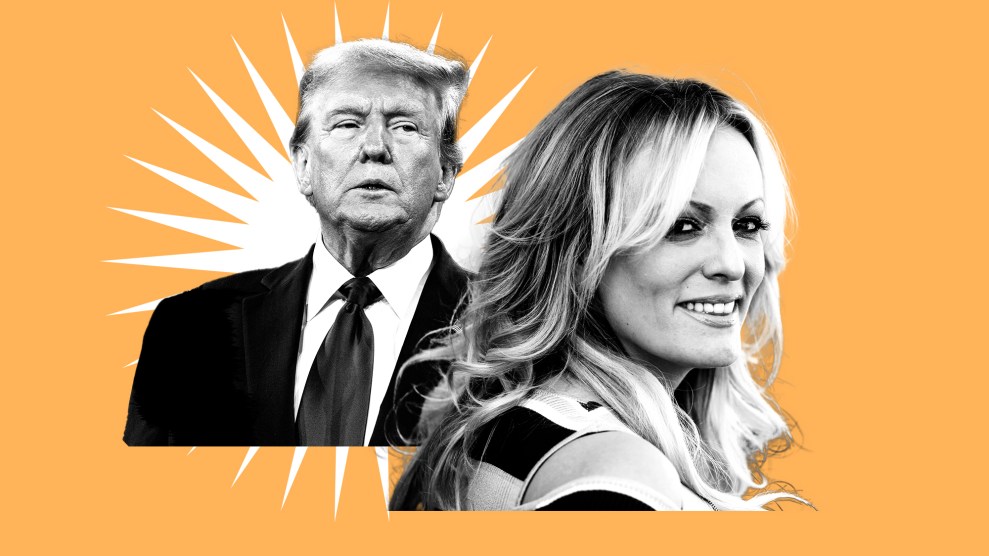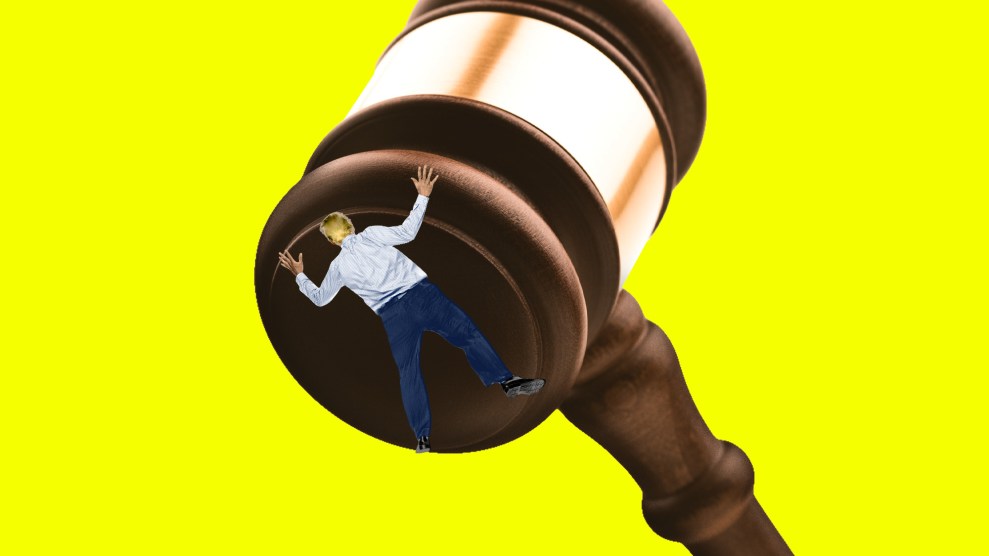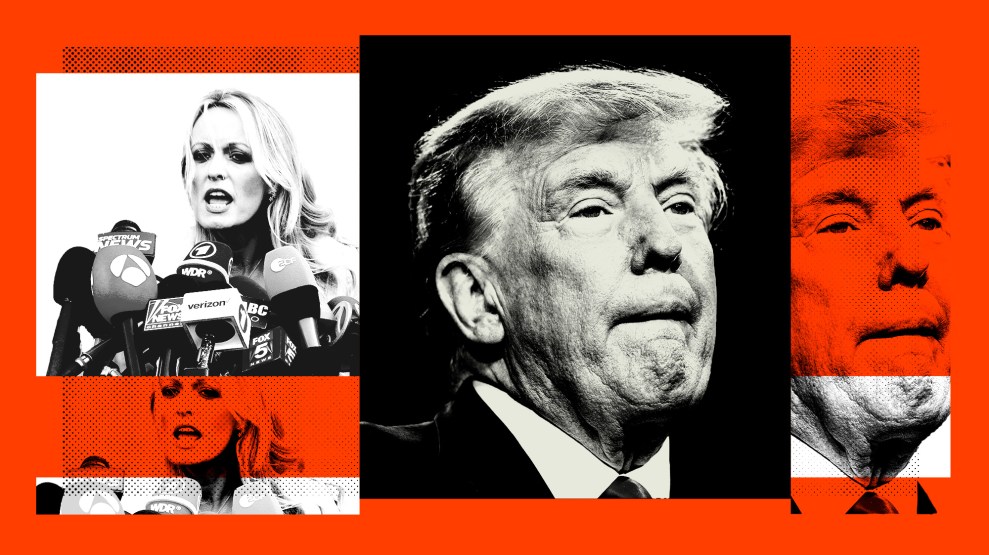
Mother Jones; Lev Radin/Sipa USA/AP, Markus Schreiber/AP
Out of the four criminal cases that Donald Trump faces, the one scheduled to begin on Monday in a New York City courtroom is not the prosecution that most addresses the threat he posed (and still poses) to American democracy. But it carries powerful symbolism, for of all Trump’s cases, this one reminds the nation that he emerged from a sleazy sewer that blended trashy celebrity culture and misogyny.
Prosecuting Trump for falsifying business records related to the hush-money pay-off made to stop porn star Stormy Daniels from blabbing about her alleged tryst with him (while Melania was home with 4-month-old Barron) may not seem as consequential and serious as placing the former president in the dock for allegedly swiping top-secret documents or for attempting to overturn American democracy so he could remain in power. Yet it seems appropriate that this history-making trial—the first time a former commander-in-chief will be prosecuted on criminal charges—arises from a tawdry and tabloidesque episode. How Trumpian.
Trump began climbing the ladder of fame in New York City in the 1980s as a brash, nepo-baby real estate developer and flashy womanizer. He boasted of his ways with the ladies, and, not surprisingly, his macho strutting was juiced by old-school objectification and brutal misogyny.
This was an image Trump assiduously created and nurtured. Often pretending to be a publicist and using an alias—John Miller or John Barron—he planted items in gossip columns about his love life. In one instance, he called a People magazine reporter, identified himself as Miller, and said of Trump, “Actresses just call to see if they can go out with him and things.” As Miller, he noted Madonna “wanted to go out with” Trump and that Trump, in addition to living with gal-pal Marla Maples, had “three other girlfriends.” As himself, he leaned on the editor of the New York Post to run a front-page story reporting that Maples had declared her romps with Trump were “the best sex I’ve ever had.” (The quote came from Trump, not Maples.)
As a regular on shock-jock Howard Stern’s radio show, Trump paraded as a playboy and obnoxious chauvinist. When Stern referred to Alicia Machado, a winner of Trump’s Miss Universe contest who had gained weight, as a “fat pig,” Trump went along and referred to Machado as an “eating machine.” On another appearance, Trump said, “A person who is very flat-chested is very hard to be a 10.” He criticized Kim Kardashian for having a “fat ass,” and he said the same of Jennifer Lopez. On one show, the pair discussed the danger of sexually transmitted diseases, and Trump remarked, “It is a dangerous world out there—it’s scary, like Vietnam. Sort of like the Vietnam era. It is my personal Vietnam. I feel like a great and very brave soldier.”
With Stern, he routinely rated famous women on their looks on a 1-to-10 scale. Shortly after the death of Princess Diana, Trump evaluated her physical appearance—her height and skin—and told Stern he believed he could have “gotten” her. Another time, Trump boasted that the National Enquirer had published a story saying, as he put it, “that in the history of the world, nobody has gotten more beautiful women than I have.” Promoting his Miss Universe pageant on Stern’s show, Trump said, “If you’re looking for a rocket scientist, don’t tune in tonight, but if you’re looking for a really beautiful woman, you should watch.”
When Stern hosted a show on E!, he also called on Trump to fill the airwaves. In one episode, Stern wanted to discuss—and drool over—Trump’s active dating life, and the tycoon obliged him. Trump acknowledged he judged women on their looks: “I tend to like beautiful women more than unattractive women. I don’t know, maybe that makes me bad.” A more telling exchange occurred in which Trump said he believed there was something “sick” about women that caused them to be attracted to men who treat them poorly.
Trump wanted to be seen as a rakish alpha male who triumphed over women and ruled within the world of the National Enquirer. It was part of his brand when he ran for president in 2016. His well-known history of tossing insults at women prompted then-Fox host Megyn Kelly to ask him at a debate about his attitudes toward women (which subsequently triggered a feud between Trump and her and her network). In that campaign, a super PAC run by a former Mitt Romney operative released a commercial featuring statements from Trump in which he derided women as “dogs” and declared his preference for women with large breasts. One Trump comment in the spot came from a 1992 magazine profile: “Women, you have to treat ’em like shit.”
Being a jerk about women was not a bug for Trump but a feature. That’s why the emergence of the Access Hollywood “grab-’em-by-the-pussy” video didn’t blow up his campaign. His voters didn’t mind his crudeness. In fact, at his rallies, women wore t-shirts that said “Trump can grab me here” with an arrow pointing toward the crotch.
Across decades, Trump pumped up his image as a swinger who viewed women as trophies and toys, with their value dependent on their looks. The Stormy Daniels case snugly fits into this narrative: Trump was a player who apparently cheated on his wife (a new mother) with a porn star. That could have been hard-core National Enquirer material—except that Trump was an important operator within the tabloid cosmos and a close pal of David Pecker, the president of the company that published the National Enquirer. Pecker and the magazine’s editor conspired with Trump to prevent Daniels from going public with her allegation right before Election Day in 2016. That resulted in the $130,000 hush-money pay-off to her. And that payment was falsely recorded on the Trump Organization books as a legal expense—which is the basis of the criminal case against Trump. The specific question at hand is whether this phony bookkeeping was done to cover up what might have been an illegal campaign expenditure concocted by Trump and his fixer Michael Cohen to influence the election.
This caper did not arise from an abuse of power; it did not concern a serious governmental matter. But it casts a light on an important slice of Trump’s origin story: his cultivation of a sordid and crude celebrity infused with misogyny. Trump’s fame—which led him to his reality TV gig with The Apprentice, which led to his political career—was a product of schlock media that fed on his well-orchestrated bad-boy behavior and sexism. The jury’s job will be to decide whether Trump violated New York State law by attempting to hide the payment to Daniels as a business expense. But the trial will mean more than that and put on the witness stand the trashy world of Donald Trump.

















